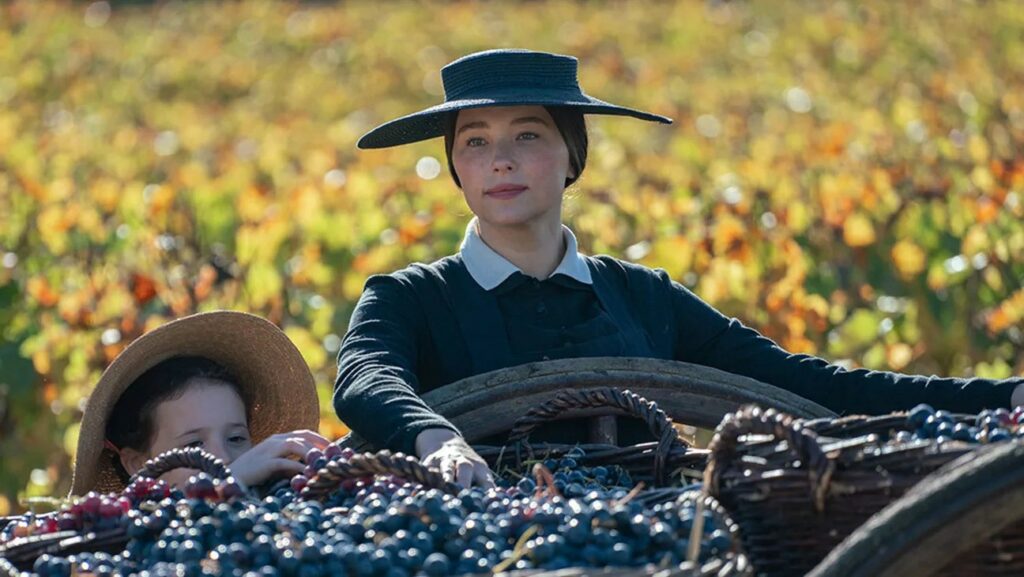Amid the glut of corporate biopics we’ve had on our screens of late — “Air,” “BlackBerry,” “Flamin’ Hot” and so on — one for leading French champagne house Veuve Clicquot is more appealing than most. Champagne itself is sexier than a running shoe or a smartphone, for one thing, while the sinuous vineyards of 19th-century Reims are a more seductive setting for a brand-building story than a squat office block in Beaverton. “Widow Clicquot” certainly makes a virtue of its milieu and rolling landscape, richly shot throughout in dusky earth tones, and more substantively, of the rather romantic lore surrounding the widow in question.
Aged just 27 when her husband died, leaving her his ailing winery, Barbe-Nicole Ponsardin Clicquot resisted buyout offers from male competitors, instead transforming it into a thriving international champagne business — the first of its kind to be run by a woman. All that, and she allegedly invented rosé champagne, in which case we collectively owe Madame Clicquot a solid, or at least a solid biopic.
“Widow Clicquot” is mostly that, relating her tale in a respectful albeit streamlined manner, and benefiting from a performance of characteristically quiet intelligence by Haley Bennett (who also produces, with husband Joe Wright) in the title role. Just don’t look for much French flair in what amounts to an Anglo-American-Europudding from British director Thomas Napper (in his first feature since his markedly grittier debut “Jawbone”). As the somewhat awkwardly anglicized title suggests, everyone speaks cut-glass English in this corner of historical France.
But if the film is efficient, and occasionally even elegant, in compressing its subject’s considerable personal and professional achievements into a surprisingly lean 90 minutes, it’s never exactly inspired. (Bryce Dessner’s strikingly stark, neo-chamber-y score is an exception.) The most ambitious structural gambit of Erin Dignam’s script is a two-track narrative that follows the widowed Barbe-Nicole’s repeatedly waylaid attempts to establish herself as a credible businesswoman as skeptical men stand in her way, while repeatedly flashing back to the final years of her marriage — as her husband François (Tom Sturridge), a passionate and rebellious winemaker, descends from eccentricity into outright madness. Both strands render Barbe-Nicole a slightly reactive figure, stifled in one timeline by staunch patriarchal convention, and in another by unruly masculine ego.
Her defiance of these obstacles is dramatized on familiar girlboss terms, entangled with some strained agricultural metaphors. “They need to struggle,” Barbe-Nicole observes of her new vines at one point. “When they struggle to survive, they become more deeply reliant on their own strength.” No prizes for guessing what else she might be talking about. Much of her struggle is against François’s dour father-in-law Philippe (Ben Miles), a man as disapproving of Barbe-Nicole’s stubborn independence as he was of his son’s unconventional approach to the family business, and an effective stand-in for the entire old guard of masculinity that she (along with what we’re told is her bracingly modern, frisky champagne) is trying to thwart.
Instead, she surrounds herself with younger, more progressive male allies, including field foreman Georges (an underused Leo Suter), accountant Edouard (Anson Boon), and most significantly, rakish wine merchant Louis Bohne (Sam Riley) — whose rule-breaking tendencies come in handy when Barbe-Nicole hits on the idea of selling her champagne beyond the bounds of then-Emperor Napoleon’s strict trade embargo. The particulars of this subversive (and not immediately successful) business strategy are glossed over more than any viewers especially interested in Veuve Clicquot’s history might prefer, though the film also tiptoes around more interesting personal dynamics of the widow’s friendship with Bohne — specifically, the insinuation that he and François were lovers.
François’s seemingly conflicted sexual identity, along with his increasingly fragile mental health, makes him the film’s most compelling and volatile character, an imbalance accentuated by the whirling intensity of Sturridge’s performance. As sympathetic and ultimately rousing as Barbe-Nicole’s career progression is, it’s the marital flashbacks here that have the most dramatic pull — as well as the least expected arc, as what is initially presented as a pure love that transcends material needs and social proprieties gradually emerges as something more unequal and even abusive.
Such details aren’t what great companies are built on, so naturally “Widow Clicquot” sidelines them to focus on more marketable uplift: a corporate mythos as warmly burnished as DP Caroline Champetier’s notably handsome lensing. Stories of human beings, however, will always be richer and messier and fizzier than stories of brands, even ones as alluring as Veuve Clicquot.
>>> Read full article>>>
Copyright for syndicated content belongs to the linked Source : Variety – https://variety.com/2024/film/reviews/widow-clicquot-review-1236079380/
